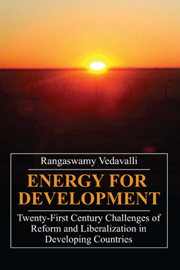 Energy for Development
Energy for Development Book contents
- Frontmatter
- Contents
- Abbreviations
- List of Tables
- List of Boxes
- Preface
- 1 The challenge of increasing access to energy for development
- 2 Changing global energy industry: implications for developing countries
- 3 Energy financing in developing countries in the pre-and post-1990s: towards energy sector reform and liberalization
- 4 Whither energy sector reform and liberalization in developing countries? A reality check
- 5 Energy sector reform and liberalization: case studies
- 6 Energy sector reform and liberalization and energy for the poor
- 7 Energy sector liberalization in developing countries: lessons and twenty-first century challenges
- 8 The way forward
- Bibliography
- Index
7 - Energy sector liberalization in developing countries: lessons and twenty-first century challenges
Published online by Cambridge University Press: 05 March 2012
- Frontmatter
- Contents
- Abbreviations
- List of Tables
- List of Boxes
- Preface
- 1 The challenge of increasing access to energy for development
- 2 Changing global energy industry: implications for developing countries
- 3 Energy financing in developing countries in the pre-and post-1990s: towards energy sector reform and liberalization
- 4 Whither energy sector reform and liberalization in developing countries? A reality check
- 5 Energy sector reform and liberalization: case studies
- 6 Energy sector reform and liberalization and energy for the poor
- 7 Energy sector liberalization in developing countries: lessons and twenty-first century challenges
- 8 The way forward
- Bibliography
- Index
Summary
This chapter synthesizes the lessons from the review of experience with energy sector reform in developing countries. The lessons discussed below enable greater understanding of challenges of energy for development at the global and national levels in the twenty-first century. They are examined later in this chapter.
Energy sector reform: 1990–2005: Lessons
Chapters 4–6 and the country studies from Asia, Latin America, the Middle East and SSA show that each area of energy policy reform—pricing, regulation, commercialization and privatization/private investment is complex as they are interlinked within energy sector and between energy and other sectors and macroeconomic fundamentals. Nonetheless, three cross-cutting lessons emerge.
First, energy sector reforms produced mixed and modest gains. Second. experience from case study situations shows the importance of effective institutions as the key to reform implementation.
And third, the expectations of various energy stakeholders in the energy market about risk-reward trade-off play a crucial role in the success or failure of reforms and the future course of the reform path.
LESSON 1: Energy sector reforms produced mixed and modest gains
Energy sector reform and liberalization was launched in the 1990s to improve sector performance and to attract investment to increase efficient energy for development in developing countries. The conventional wisdom was that moving to market pricing of energy, setting up regulatory institutions to create an environment for competition and private investment and restructuring of energy enterprises by privatization/private investment would improve efficiency and increase access to energy supply in developing countries.
- Type
- Chapter
- Information
- Energy for DevelopmentTwenty-first Century Challenges of Reform and Liberalization in Developing Countries, pp. 369 - 436Publisher: Anthem PressPrint publication year: 2007


